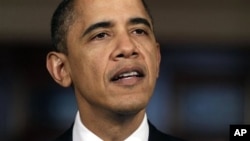President Barack Obama on Wednesday strongly condemned Libyan government-sanctioned violence against demonstrators, and said the United States is stepping up international consultations on how to deal with the situation. The president appeared with Secretary of State Hillary Clinton after talks at the White House.
The president's remarks came at the end of a day in which the United States intensified consultations with other governments to exert more pressure on the Libyan government to end violence against protesters, and worked to ensure that Americans trying to leave Libya can do so safely.
Without mentioning Libyan leader Moammar Gadhafi by name, Mr. Obama said the Libyan government will be held accountable for violence against peaceful protesters. And he condemned the government-sanctioned violence.
Watch Laurel Bowman's Companion TV Report:
"The American people extend our deepest condolences to the families and loved ones to all who have been killed and injured. The suffering and bloodshed is outrageous and it is unacceptable. So are threats and orders to shoot peaceful protesters and further punish the people of Libya," he said.
Saying that the Libyan government has a responsibility to refrain from violence, allow humanitarian assistance to reach those in need and respect the rights of its people, Mr. Obama said "it will also be held accountable for its failure to meet those responsibilities and face the cost of continued violations of human rights."
At his side was Secretary of State Hillary Clinton, who spoke earlier at the State Department. The president announced she will go to Geneva next week to attend a meeting of United Nations Human Rights Council foreign ministers to discuss the turmoil in the region.
The president also announced that U.S. Undersecretary of State for Political Affairs William Burns will make several stops in the region and in Europe as part of international consultations.
Earlier, White House Press Secretary Jay Carney took reporters' questions about the implications of events in Libya for U.S. foreign policy and steps Washington might take. "The most effective action here will be taken in a united way by the United States, with its international partners. That will have hopefully the most significant impact on the behavior of the Libyan government," he said.
Carney said the United States is considering "multilateral actions as well as bilateral actions," but he declined to discuss options that have been suggested such as establishment of a no-fly zone over Libya or possible NATO involvement.
Carney said President Obama's speech in Cairo in 2009, in which he called on countries to respond to democratic aspirations, could be seen as a starting point to understand the U.S. perspective and policy toward the region amid the recent turmoil.
In his remarks on Tuesday, President Obama reiterated that unrest in the region is being driven by people's desire for change. "Let me be clear. The change that is taking place across the region is being driven by the people of the region. This change doesn't represent the work of the United States or any foreign power. It represents the aspirations of people who are seeking a better life," he said.
Even as his administration looks at "the full range of options" to respond to the crisis in Libya, President Obama said the United States continues to address events elsewhere, including how to "most effectively support the peaceful transition to democracy in both Tunisia and Egypt."



















